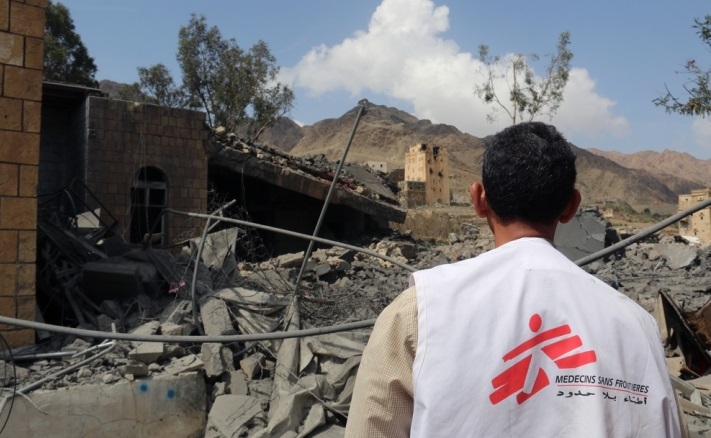On Tuesday, Medicins Sans Frontieres (MSF) released the findings from their investigations into two Saudi-led coalition airstrikes on medical facilities in Yemen. The attacks struck an MSF clinic in Taiz city on 2 December 2015 and, more recently, targeted a hospital in Abs, Hajjah province on 15 August 2016. In both cases, the report concludes the bombings hit fully functioning health facilities in complete violation of the relevant protections under International Humanitarian Law (IHL). While the report on the clinic airstrike in Taiz illustrates coalition recklessness from earlier on in the campaign, it is the extensive details on the more recent hospital attack in Abs which provide a chilling play-by-play of the Saudi coalition’s “utter disregard for civilian life.”
For its investigation into the August attack, MSF conducted 35 interviews with key staff from the Yemen mission and the Abs hospital project, including direct eyewitnesses of the attack, and patients who were in the hospital at the time. On Monday 15 August at 3:40pm local time, a coalition plane launched a strike on Abs hospital without warning or communicating with the MSF mission. At the time of the attack, there were 23 patients in surgery, 25 in the maternity ward, 12 in pediatrics and 13 newborns at Abs hospital.
The report describes the impact of the strike, “The blast was very powerful. It left a big crater and was felt throughout the hospital, where windows were shattered despite the blast film applied on them.” The attack left 19 dead, including one MSF staff member, and injured 24. Thirteen people died from severe shrapnel injuries. Two, including one child, burned to death inside a car. And of the last four casualties, only partial remains were found. The human toll extends further to patients who were in critical condition at the time of the airstrike and suffered while escaping. At least one prematurely born baby, whose parents fled the destruction, died en route to another medical facility.
The MSF investigation found no legitimate justification for the coalition strike and notes that any justification would have still have required advance warning by the Saudi coalition. MSF had notified all parties in the conflict of the location of the Abs hospital and regularly shared the GPS coordinates with the Saudi led coalition. The latest communication of the GPS coordinates for all MSF operations was just five days before the attack. In addition to turning a blind eye to the intelligence provided by MSF, the Saudi forces were irresponsibly blind to the scene on the ground. The Abs hospital complex lies conspicuously within an enclosed and gated area that has the MSF logo at the entrance and the MSF logo painted on the roof of several buildings.
Despite MSF taking all the necessary precautions, the Saudi led coalition obliterated one of the last remaining sources of medical care in the region. Since MSF began supporting the facility roughly a year ago, the Abs hospital has treated over 14,000 patients, including over 1,500 childbirths. According to the report, in the month before the airstrike on the hospital, 22 percent of the hospital’s emergency room patients were under 5 years old. After the bombing, MSF made the painful decision to pull its 205-member staff from the facility as well as their teams from five other hospitals in northern Yemen.
Today, the United Nations Security Council (UNSC) convenes for a closed session on the protection of medical missions. In May the UNSC passed Resolution 2286, which condemns attacks on medical facilities and personnel in conflict zones. However, members have yet to take concrete measures in safeguarding facilities and in holding violators accountable. As a result, strikes on medical facilities and their aftermaths continue to torment the lives of civilians and their caretakers. Two weeks after the Abs attack, a woman was giving birth to her child in the facility when, in the final stage of labor, she heard the sound of a plane overhead. She stood up and immediately ran away from the hospital, mostly likely giving birth somewhere between the hospital and her house. As the UNSC meets today, it is this woman, her baby, and the countless other Yemeni civilians, whose lives hang in the balance.
Leah Schulz is an Advocacy Fellow at ADHRB





